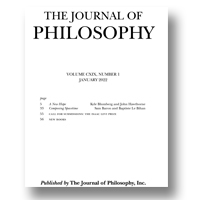|
1.
|
The Journal of Philosophy:
Volume >
120 >
Issue: 9
Christopher Cowie
Why Moral Paradoxes Support Error Theory
abstract |
view |
rights & permissions
| cited by
Moral error theory has many troubling and counterintuitive consequences. It entails, for example, that actions we ordinarily think of as obviously wrong are not wrong at all. This simple observation is at the heart of much opposition to error theory. I provide a new defense against it. The defense is based on the impossibility of finding satisfying solutions to a wide range of puzzles and paradoxes in moral philosophy. It is a consequence of this that if any moral claims are true, then a lot of highly troubling and counterintuitive moral claims must be in their number. This means that troubling and counterintuitive moral claims are everybody’s problem—not just error theorists’, but also their opponents’. Indeed, there is a sense in which this shared problem is worse for the opponents of error theory than for error theorists themselves.
|
|
|
2.
|
The Journal of Philosophy:
Volume >
120 >
Issue: 9
Bjørn Jespersen
Is Act Theory a Propositional Logic without Logic?
abstract |
view |
rights & permissions
| cited by
This is a critique of Hanks’s theory of propositions, which identifies propositions with predicative act types imbued with assertoric force. This identification turns propositions into assertoric contexts. Disjunctive propositions obey a fine-grained logic: b asserting A does not entail b asserting the disjunction A or B. Conjunctive propositions obey a coarser-grained logic: b asserting the conjunction A and B entails b asserting A and b asserting B. Distribution of assertion over conjunction inverts the scope distribution of the force operator and the logical operator, whereby the former can also take narrow scope with respect to the latter. Non-conjunctive molecular propositions, however, need to suspend the force of their constituent propositions, but then why identify propositions with assertoric contexts? I show that Hanks’s theory both fails to formally validate distribution over conjunction and to accommodate the divergent behavior of its disjunctive and conjunctive propositions. Also, I argue that distribution is philosophically a bad idea, anyway.
|
|





